名词性从句
- 格式:docx
- 大小:35.47 KB
- 文档页数:5
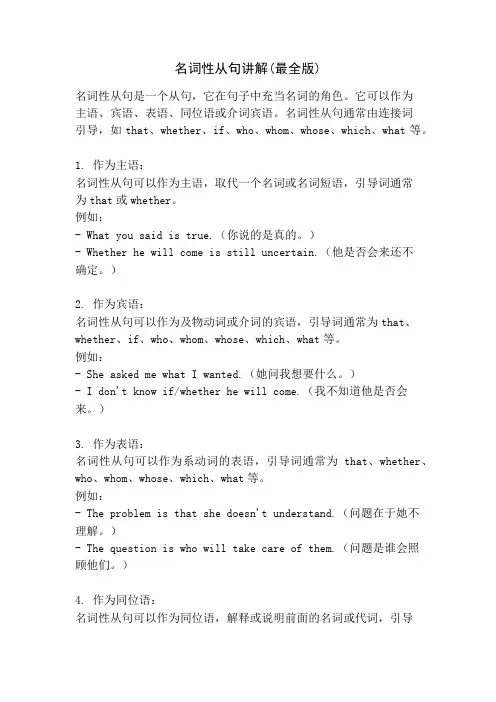
名词性从句讲解(最全版)名词性从句是一个从句,它在句子中充当名词的角色。
它可以作为主语、宾语、表语、同位语或介词宾语。
名词性从句通常由连接词引导,如that、whether、if、who、whom、whose、which、what等。
1. 作为主语:名词性从句可以作为主语,取代一个名词或名词短语,引导词通常为that或whether。
例如:- What you said is true.(你说的是真的。
)- Whether he will come is still uncertain.(他是否会来还不确定。
)2. 作为宾语:名词性从句可以作为及物动词或介词的宾语,引导词通常为that、whether、if、who、whom、whose、which、what等。
例如:- She asked me what I wanted.(她问我想要什么。
)- I don't know if/whether he will come.(我不知道他是否会来。
)3. 作为表语:名词性从句可以作为系动词的表语,引导词通常为that、whether、who、whom、whose、which、what等。
例如:- The problem is that she doesn't understand.(问题在于她不理解。
)- The question is who will take care of them.(问题是谁会照顾他们。
)4. 作为同位语:名词性从句可以作为同位语,解释或说明前面的名词或代词,引导词通常为that、whether、who、whom、whose、which、what等。
例如:- The fact that he lied surprised me.(他撒谎的事实让我感到惊讶。
)- His belief that she will succeed is unwavering.(他坚信她会成功。
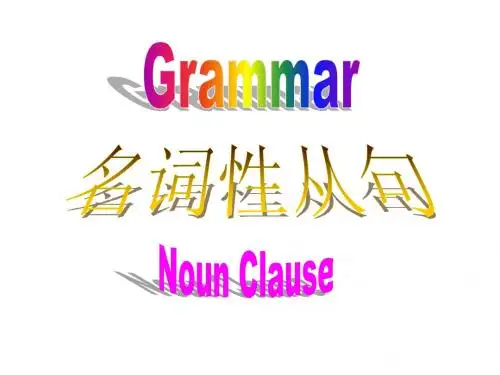
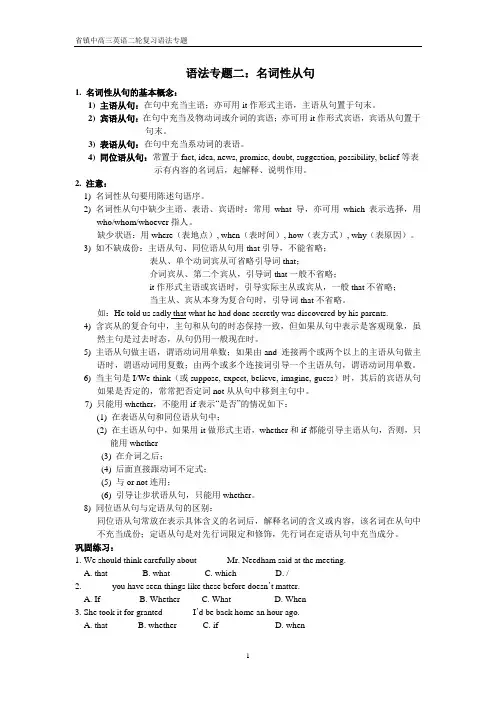
语法专题二:名词性从句1. 名词性从句的基本概念:1) 主语从句:在句中充当主语;亦可用it作形式主语,主语从句置于句末。
2) 宾语从句:在句中充当及物动词或介词的宾语;亦可用it作形式宾语,宾语从句置于句末。
3) 表语从句:在句中充当系动词的表语。
4) 同位语从句:常置于fact, idea, news, promise, doubt, suggestion, possibility, belief等表示有内容的名词后,起解释、说明作用。
2. 注意:1) 名词性从句要用陈述句语序。
2) 名词性从句中缺少主语、表语、宾语时:常用what 导,亦可用which表示选择,用who/whom/whoever指人。
缺少状语:用where(表地点), when(表时间), how(表方式), why(表原因)。
3) 如不缺成份:主语从句、同位语从句用that引导,不能省略;表从、单个动词宾从可省略引导词that;介词宾从、第二个宾从,引导词that一般不省略;it作形式主语或宾语时,引导实际主从或宾从,一般that不省略;当主从、宾从本身为复合句时,引导词that不省略。
如:He told us sadly that what he had done secretly was discovered by his parents.4) 含宾从的复合句中,主句和从句的时态保持一致,但如果从句中表示是客观现象,虽然主句是过去时态,从句仍用一般现在时。
5) 主语从句做主语,谓语动词用单数;如果由and 连接两个或两个以上的主语从句做主语时,谓语动词用复数;由两个或多个连接词引导一个主语从句,谓语动词用单数。
6) 当主句是I/We think(或suppose, expect, believe, imagine, guess)时,其后的宾语从句如果是否定的,常常把否定词not从从句中移到主句中。
7) 只能用whether,不能用if表示“是否”的情况如下:(1) 在表语从句和同位语从句中;(2) 在主语从句中,如果用it做形式主语,whether和if都能引导主语从句,否则,只能用whether(3) 在介词之后;(4) 后面直接跟动词不定式;(5) 与or not连用;(6) 引导让步状语从句,只能用whether。

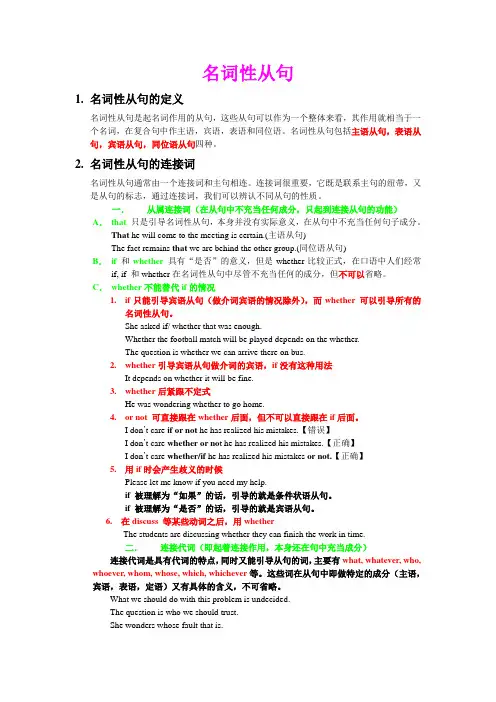
名词性从句1.名词性从句的定义名词性从句是起名词作用的从句,这些从句可以作为一个整体来看,其作用就相当于一个名词,在复合句中作主语,宾语,表语和同位语。
名词性从句包括主语从句,表语从句,宾语从句,同位语从句四种。
2.名词性从句的连接词名词性从句通常由一个连接词和主句相连。
连接词很重要,它既是联系主句的纽带,又是从句的标志,通过连接词,我们可以辨认不同从句的性质。
一.从属连接词(在从句中不充当任何成分,只起到连接从句的功能)A.that 只是引导名词性从句,本身并没有实际意义,在从句中不充当任何句子成分。
That he will come to the meeting is certain.(主语从句)The fact remains that we are behind the other group.(同位语从句)B.if和whether具有“是否”的意义,但是whether比较正式,在口语中人们经常if, if 和whether在名词性从句中尽管不充当任何的成分,但不可以省略。
C.whether不能替代if的情况1.if只能引导宾语从句(做介词宾语的情况除外),而whether 可以引导所有的名词性从句。
She asked if/ whether that was enough.Whether the football match will be played depends on the whether.The question is whether we can arrive there on bus.2.whether引导宾语从句做介词的宾语,if没有这种用法It depends on whether it will be fine.3.whether后紧跟不定式He was wondering whether to go home.4.or not 可直接跟在whether后面,但不可以直接跟在if后面。
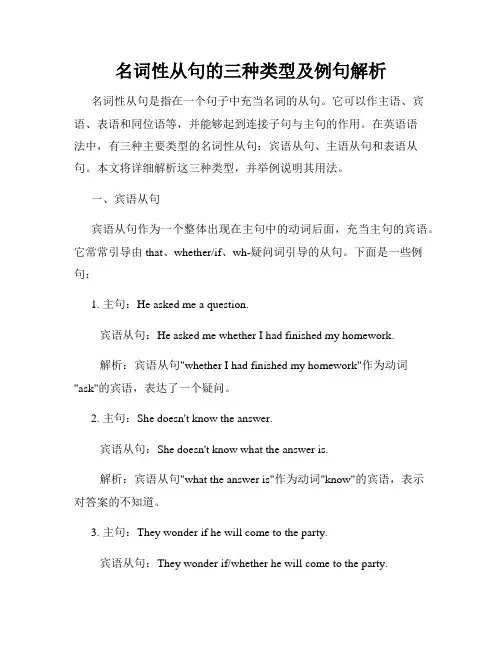
名词性从句的三种类型及例句解析名词性从句是指在一个句子中充当名词的从句。
它可以作主语、宾语、表语和同位语等,并能够起到连接子句与主句的作用。
在英语语法中,有三种主要类型的名词性从句:宾语从句、主语从句和表语从句。
本文将详细解析这三种类型,并举例说明其用法。
一、宾语从句宾语从句作为一个整体出现在主句中的动词后面,充当主句的宾语。
它常常引导由that、whether/if、wh-疑问词引导的从句。
下面是一些例句:1. 主句:He asked me a question.宾语从句:He asked me whether I had finished my homework.解析:宾语从句"whether I had finished my homework"作为动词"ask"的宾语,表达了一个疑问。
2. 主句:She doesn't know the answer.宾语从句:She doesn't know what the answer is.解析:宾语从句"what the answer is"作为动词"know"的宾语,表示对答案的不知道。
3. 主句:They wonder if he will come to the party.宾语从句:They wonder if/whether he will come to the party.解析:宾语从句"if/whether he will come to the party"作为动词"wonder"的宾语,表达了对他是否会来参加派对的疑问。
二、主语从句主语从句作为一个整体出现在句子的最前面,充当主句的主语。
它通常由that引导,也可以由wh-疑问词引导。
以下是一些例句:1. 主句:It is important to learn a foreign language.主语从句:That she is a hardworking student is important.解析:主语从句"That she is a hardworking student"作为句子的主语,强调了她是一个勤奋的学生的重要性。

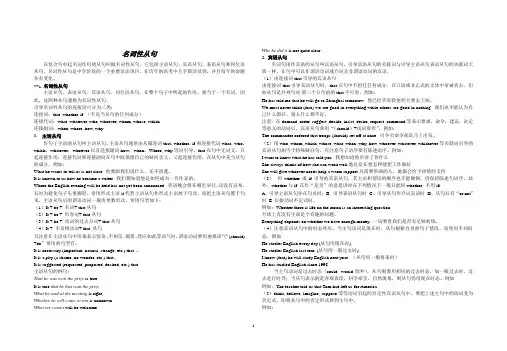
名词性从句在复合句中起名词作用的从句叫做名词性从句。
它包括主语从句、宾语从句、表语从句和同位语从句。
名词性从句是中学阶段的一个重要语法项目,在历年的高考中几乎都涉及到,并且每年的命题各有变化。
一、名词性从句主语从句、表语从句、宾语从句、同位语从句,在整个句子中所起的作用,相当于一个名词。
因此,这四种从句通称为名词性从句。
引导名词性从句的连接词可分为三类:连接词:that, whether, if (不充当从句的任何成分)连接代词:what, whatever, who, whoever, whom, whose, which.连接副词:when, where, how, why1.主语从句作句子主语的从句叫主语从句。
主语从句通常由从属连词that,whether,if和连接代词what,who,which,whatever,whoever以及连接副词how,when,Where, why等词引导。
that在句中无词义,只起连接作用;连接代词和连接副词在句中既保留自己的疑问含义、又起连接作用,在从句中充当从句的成分。
例如:What he wants to tell us is not clear. 他要跟我们说什么,还不清楚。
It is known to us how he became a writer. 我们都知道他是如何成为一名作家的。
Where the English evening will be held has not yet been announced. 英语晚会将在哪里举行,还没有宣布。
有时为避免句子头重脚轻,常用形式主语it代替主语从句作形式主语放于句首,而把主语从句置于句末。
主语从句后的谓语动词一般用单数形式。
常用句型如下:(1)It + be + 名词+ that从句(2)It + be + 形容词+ that从句(3)It + be + 动词的过去分词+ that从句(4)It + 不及物动词+ that 从句另注意在主语从句中用来表示惊奇、不相信、惋惜、理应如此等语气时,谓语动词要用虚拟语气“(should) +do”常用的句型有:It is necessary (important, natural, strange, etc.) that …It is a pity (a shame, no wonder, etc.) that…It is suggested (requested, proposed, desired, etc.) that主语从句的例句:That he was won the prize is true.It is true that he has won the prize.What he said at the meeting is right,Whether he will come or not is unknown.Whoever comes will be welcome. Why he did it is not quite clear.2. 宾语从句名词句用作宾语的从句叫宾语从句。

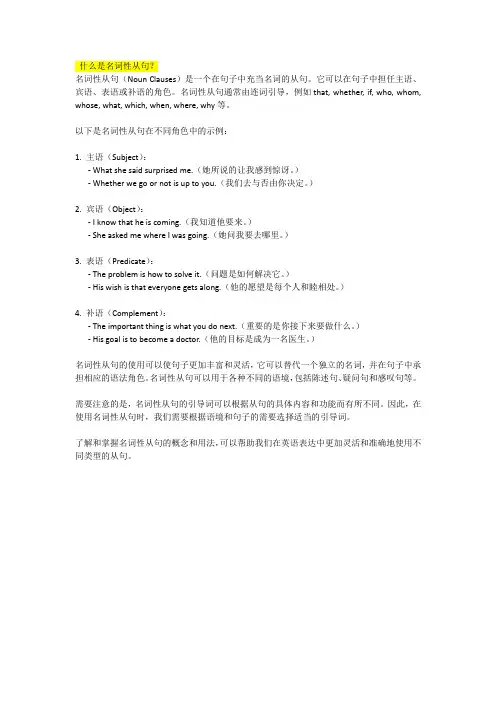
什么是名词性从句?名词性从句(Noun Clauses)是一个在句子中充当名词的从句。
它可以在句子中担任主语、宾语、表语或补语的角色。
名词性从句通常由连词引导,例如that, whether, if, who, whom, whose, what, which, when, where, why等。
以下是名词性从句在不同角色中的示例:1. 主语(Subject):- What she said surprised me.(她所说的让我感到惊讶。
)- Whether we go or not is up to you.(我们去与否由你决定。
)2. 宾语(Object):- I know that he is coming.(我知道他要来。
)- She asked me where I was going.(她问我要去哪里。
)3. 表语(Predicate):- The problem is how to solve it.(问题是如何解决它。
)- His wish is that everyone gets along.(他的愿望是每个人和睦相处。
)4. 补语(Complement):- The important thing is what you do next.(重要的是你接下来要做什么。
)- His goal is to become a doctor.(他的目标是成为一名医生。
)名词性从句的使用可以使句子更加丰富和灵活,它可以替代一个独立的名词,并在句子中承担相应的语法角色。
名词性从句可以用于各种不同的语境,包括陈述句、疑问句和感叹句等。
需要注意的是,名词性从句的引导词可以根据从句的具体内容和功能而有所不同。
因此,在使用名词性从句时,我们需要根据语境和句子的需要选择适当的引导词。
了解和掌握名词性从句的概念和用法,可以帮助我们在英语表达中更加灵活和准确地使用不同类型的从句。

名词性从句有哪些名词性从句共有四种,分别是主语从句(整个从句在主句中做主语),表语从句(整个从句在主句中做表语),同位语从句(整个从句在主句中做同位语),宾语从句四类(整个从句在主句中做宾语)。
名词性从句有哪些1、主语从句例如:It + be + 形容词/名词/动词过去分词 + that 从句It is strangethat he knows nothing about it.从句:He knows nothing about it.主句:It is strange something (= He knows nothing about it).连接词在从句中是否充当成分:否连接词是否可省:否2、宾语从句例如:that 引导的宾语从句I think that English is important.从句:English is important.主句:I think something (= English is important).连接词在从句中是否充当成分:否连接词是否可省:是3、表语从句用法和结构同宾语从句,区别在于:系动词后面所接的从句为表语从句,而及物动词后面所接的从句为宾语从句。
例如:- that 引导的表语从句The truth is that English is important.从句:English is important.主句:The truth is something (= that English is important).4、同位语从句同位语从句就是在复合句中作名词的同位语的名词性从句。
同位语从句对于名词进一步解释,说明名词的具体内容,一般由that引导,同位语从句有时可以不紧跟在它所说明的名词后面,而是被别的词隔开。
名词性从句一.什么是名词性从句?在主句充当名词通常能够充当成分的从句,叫名词性从句。
主语从句,宾语从句,表语从句,同位语从句。
What I need is a new desk.He said that he will leave for Beijing next week.His question is when the sports meet will take place.He told me a lie that he had learned five foreign languages.从以上例句中,可以看出名词性从句没有先行词。
同位语从句的情况待后面解释。
不同的从句在以后的讲解中我们会逐渐熟悉。
二.连接词。
1.That 不充当任何成分,没有任何意思,只起连接作用。
发生了这场事故是你的错。
That the accident happened is your fault.I had no idea that you were here.以上两句中,that 不可省略,只能在宾语从句中省略。
如果省略的话,句子的意思不清,句子成分也不明。
2.whether, if ( 不做句子成分,有意思,有连接作用)The question is whether the book is worth reading.Whether the pollution can be controlled depends on the effect we will make.以上两句不能用if代替whether.If 只能用于宾语从句,但不能用于介词宾语从句。
He didn’t make sure if (whether)he would take p art in the party.Everything depends on whether we have enough experience.3.连接代词或连接副词(所有疑问代词和疑问副词都可以转为连接代词或连接副词)(做句子成分,有意思,有连接作用。
名词性从句联词有连接词that, if, whether;连接代词who, what, which;连接副词when, where, how, why 等。
1. 主语从句1)主语从句在句中做主语。
它可以放在主句谓语动词之前,但多数情况下由it 作形式主语,而把主语从句放在主句之后。
引导主语从句的词有连词that, whether;连接代词who, what, which;连接副词when, where, how, why 等。
e.g. That she was able to come made us very happy.Whether she will come or not is still a question.What we need is more time.Who will go makes no difference.Which team will win the match is still unknown.When they will start is not known yet.Where she has gone is a mystery.How this happened is not clear.Why he did that wasn’t quite clear.2)主语从句常用it 作形式主语It is + 名词/形容词/过去分词+主语从句e.g. It is still a question whether she will come or not.It is strange that you should like him.It is still unknown which team will win the match. 此外,以下结构也较多见:It turned out that…… (结果是……)It has been found that…… (已经发现……)It has been proved that…… (已经证明……)It happened/occurred that…… (恰好)It is well-known that…… (众所周知……)It is said/reported that…… (据说/报导……)It must be pointed out that…… (必须指出……)It doesn’t matter whether…… (是否……都没关系)It makes no difference whether…… (是否……毫无区别)2.表语从句1)表语从句位于系动词之后,由that 引导,起连接作用的that 有时可省略。
名词性从句一名词性从句包括主语从句、宾语从句、表语从句、同位语从句。
1.主语从句:主语从句在整个句子中作主语。
(1)不同于其它的连词,它不充当句子的成分,只是单纯的连接词,通常不可以省略,有时为了保持句子平衡, that从句后置, 而由it作形式主语。
其他类似句型还有:It + be +important/ necessary/ obvious + that 从句It + be +reported/believed/thought/has been decided + that从句It + be +a pity/a shame/a fact/a surprise/ common knowledge+ that从句It + happens/occurs/seems/appears + that 从句That the driver could not control his war was obvious.It was obvious that the driver could not control his car.(2)if 不能用在主语从句中,而是用whether Whether he left (or not) is unknown(3)当主语从句作主语时,谓语动词一般用第三人称单数What we need is more time and money.What we need are many more books.2.表语从句:表语从句出现在系动词后,充当表语。
其基本结构为: 主语 + 系动词 + that从句。
The trouble is that we are short of money.Go and get your coat. It’s where you left it.3.宾语从句:及物动词,形容词和介词后加宾语从句作其宾语。
(1)宾语从句时态与主句相呼应,但宾语从句表示的是客观真理或普遍现象除外The teacher told us that the earth moves aroundthe sun(2)连词whether和 if可以互换,但注意下列情况连词后紧跟or not时用whether I want to knowwhether or not they will come. 作介词宾语是用whether引导宾语从句He wasinterested in whether he saw her there. 连接词后直接加不定式,不能用if只能用whether Hedoesn’t know whether to stay or not. 如果宾语从句是否定时,一般用if引导I care ifhe will not attend the meeting.(3)当宾语从句后带宾补时,要用“主语+谓语+it +宾补+that-clause,that不可省略I think it certain that she will do well inher exam.(4)当主语是I, we ,主句用think, believe, suppose, expect, imagine五个动词时,用否定转移I don’t think he will win the game, will he?(5)that在宾语从句常可以省略,但由and或 but连接两个或多个宾语从句时,仅可以省略第一个连词that He said (that) he had eaten nothing but that he wasn’t hungry.(6)注意区别if引导的宾语从句和条件状语从句I don’t know if he will come.If he comes, I’ll let you know.注意:beg, insist, desire, command, order, suggest, advise, demand, require, request等动词如果后面加上宾语从句的话, 从句谓语部分必须用should do。
名词性从句noun clauses1. 名词性从句定义:在句子中起名词作用的句子叫名词从句。
(Noun Clauses)2. 名词从句的功能相当于名词词组, 它在复合句中能担任主语、宾语、表语、同位语等。
3. 因此根据它在句中不同的语法功能,名词从句包括:主语从句、宾语从句、表语从句和同位语从句。
1)What he does is important.2) I don’t like what he does everyday.3) This is what he does everyday.4) I don’t know about the fact that he is a teacher.4. 名词性从句中的连接词有:连词: that / whether / as if (though)连接代词: what /who/which / whose / whatever / whoever / whomever / whichever 连接副词: where / when / why / how / wherever / whenever1.宾语从句:1)定义:跟在动词或介词后面的从句叫宾语从句。
2)引导宾语从句的连接代词主要有: who, whom, what, which, whatever, whoever 等;连接副词主要有:where, when, how, why 等; 连词主要有that, if, whether。
3) that 在引导宾语从句时无词义,也不充当任何成分,且通常可以省略。
但如果含有两个或两个以上的并列宾语从句时,通常只有第一个从句的that可以省略,其余从句的that 一般不能省略。
如:My uncle said (that) he would come and that he would also bring his son.宾语从句中的连接词that在以下三种情况下不能省略:①当有两个that从句时, 第二个that不能省;②当that作介词宾语时, that不可省掉。
(十三) 名词性从句1. 名词性从句的概念:名词性从句是一个相当于名词短语的从句,充当主句的主语、表语、宾语和同位语,分别称为主语从句、表语从句、宾语从句和同位语从句。
2. 名词性从句的引导词和种类:1)根据名词性从句的引导词,名词性从句有以下几类:(1) that引导的名词性从句表示一件事情。
注意:因为that后面是对某事的完整陈述,所以that在从句中不作任何成分,没有意义,只引导从句;但除了引导动词宾语从句的that可省略外,其余情况都不能省略。
另外that不能引导介词宾语从句(除了except 和in后面)。
That he was his enemy’s son shocked him. = It shocked him that he was… 他是他敌人的儿子让他很惊愕。
(主语从句)He knew (that) the professor had refused to take on his son. 他知道教授已经拒绝了收他的儿子为学生。
(动词宾从句)He was quite good-looking except that he was a little too short. 那时候他除了个子矮了点还算长得不错。
(介词宾从句)The truth is that there is no standard American English at all. 事实是根本就没有所谓标准美国英语。
(表语从句) The belief that God created everything in the world is popular among the western countries. 上帝创造了世间万物的信仰在西方国家很普遍。
(同位语从句,和the belief同位,表示抽象名词belief的具体内容)I was under the impression that you would come the next day. 我当时以为你第二天会来。
什么是名词性从句?名词性从句(Noun Clauses)是一种在句子中作为名词的从句。
这意味着它可以在句子中担任名词的角色,例如主语、宾语、表语或补语。
名词性从句通常由连接词引导,如that, whether, if, who, whom, whose, which, what, when, where, why等。
下面是关于名词性从句的详细解释和使用方法:1. 主语从句(Subject Clauses):主语从句在句子中充当主语的角色,它引导整个从句的连接词通常是that或whether。
以下是主语从句的一些例子:- That he passed the exam made her happy.(他通过了考试使她开心。
)- Whether we should go or not is still undecided.(我们是否应该去还没有决定。
)需要注意以下几点:-当主语从句以that引导时,that往往可以省略,但在某些情况下必须保留,如在强调句型中。
-当主语从句以whether引导时,通常表示两个选择或疑问。
2. 宾语从句(Object Clauses):宾语从句在句子中充当动词的宾语,它可以作为及物动词、介词或不定式的宾语。
以下是宾语从句的一些例子:- She asked if I could help her.(她问我是否能帮助她。
)- He doesn't know what to do.(他不知道该做什么。
)需要注意以下几点:-当宾语从句以that引导时,that往往可以省略,特别是在口语中。
-当宾语从句以whether或if引导时,表示选择或疑问的情况。
3. 表语从句(Predicate Clauses):表语从句在句子中充当表语的角色,它通常用来描述主语的性质、状态或特征。
以下是表语从句的一些例子:- The important thing is that you try your best.(重要的是你尽力。
名词性从句Noun Clauses一.名词性从句学习目标:1. 在复合句中能识别出主语从句、表语从句、宾语从句和同位语从句;2. 辨别使用引导名词性从句的连接词;3. 区分同位语从句和定语从句。
二.名词性从句在高考中的考查重点:1. that和what引导名词性从句的区别;2. 名词性从句的语序和时态;3. it作形式主语、形式宾语的几种情况;4. 宾语从句的否定转移;5. whether和if的用法区别;6. what在名词性从句中的使用;7. who / whoever, what / whatever等的用法区别;8. 连接词that的省略。
三.Lead-in1.Question:名词在句中可以充当什么成分?2. 名词性从句概念:由一个从句来充当名词的作用,如主语,表语,宾语,同位语等。
His job is important. This is his job.What he does is important. This is what he does every day.I don’t like his job. I don’t know about the man, Mr. White.I don’t like what he does every day. I don’t know about the fact that he is a teacher.3. 名词性从句四.引导名词性从句的连接词可分为三类:1. 连词:that, whether, if不充当从句的任何成分。
2. 连接代词:what, whatever, who, whoever, which, whichever, whom, whose, etc. 不仅起到连接一个句子的作用,同时也是从句的一个组成部分。
3. 连接副词:when, where, how, why, etc.五.名词性从句的用法1.主语从句Subject ClauseHow the book will sell depends on its author.That he is the best student in the class is obvious.Whether we shall attend the meeting hasn’t been decided yet.Who will go makes no difference.在一个句子中由一个句子充当的主语,这个句子叫做主语从句。
注意一:主语从句后置!为了避免主语冗长,句子头重脚轻,经常用it作形式主语,主语从句放在后面作真正的主语.1.That we shall be late is certain.It’s certain that we shall be late.2. That the earth is round is known to all.-- It’s known to all that the earth is round.3. That you missed the chance is a pity.--It is a pity that you missed the chance.it作形式主语,that引导的从句是句子的真正主语,有以下四种不同的结构:a.It + be + 形容词+ that-从句It is necessary that …有必要……It is important that …重要的是……It is obvious that …很明显……It + be + 形容词+ that-从句(常用的形容词有:likely, right , wrong, certain, necessary, important, natural, strange, obvious, clear等)从句谓语动词常用“should +动词原形”,should 也可省略。
It is necessary that we (should) buy a Chinese-English dictionary.It is likely that there will be a snowstorm tomorrow.b. It + be + -ed(said/reported)分词+ that-从句It is believed that …人们相信……It is known to all that …众所周知……It has been decided that …已决定……常用的动词-ed 形式:said, believed, hoped, reported, told, thought, advised, decided, suggested, ordered等It is said that the famous writer will visit our school next week.It was suggested that each student (should) sing a song in English.※在“It is advised/decided/suggested/ordered+ that从句”结构中,从句谓语动词常用“should +动词原形”,should 也可省略。
c. It + be + 名词(a pity/no surprise)+ that-从句It is common knowledge that ………是常识It is a surprise that …令人惊奇的是……It is a fact that …事实是……常用的名词有:a pity, a shame, a fact, an honor, a wonder, no wonder, good news等It is a pity that you didn’t attend the lecture.It is no wonder that you have achieved so much success.d.It +特殊动词+ that 从句It appears that …似乎……It happens that …碰巧……It occurred to me that …我突然想起……It happened that I knew how to deal with it.It doesn’t matter whether he is wrong or not主谓一致问题主语是名词性从句, 动词通常用单数。
What I am most interested in is American movies.我最感兴趣的是美国电影。
What you said yesterday is right.你昨天说的是对的。
whether与if均为“是否”下列情况下只用whether:Whether he will come is not clear. 1. 引导主语从句并在句首The question is whether he’ll come.2. 引导表语从句I’m not sure about whether we’ll win.3. 从句作介词宾语Whether you like it or not, you’ll have to do it.4. 从句后有"or not"2. 表语从句Predicative Clause在一个句子中由一个句子充当的表语,这个句子叫做表语从句。
The question is whether he will come or not.Changsha is not what it used to be.This is how we got out of trouble then.It looks as if it is going to rain.The fact is that he has not been seenrecently.The reason why he was late was that he didn’t get up on time.My suggestion is that we should turn the land into rice fields.如果引出表语从句的名词是一些表示“建议”或者是“命令”之类的词, 如:advice, suggestion, proposal, order, plan, idea等, 那么从句中的动词通常1) My suggestion is that we all ___________ (take) an active part in the coming sports meet.2) His proposal was that the work _________________ (finish) in five hours.宾语从句Object Clause在一个句子中由一个句子充当的宾语,这个句子叫做宾语从句。
通常放在主句谓语动词(及物动词)或介词之后作动词的宾语She did not know what had happened.She told me that she would accept my invitationI worry about whether he can get over the illness.John said that he was leaving forLondon on Wednesday. .2. 作介词的宾语Our success depends upon how well we can cooperate with one another.3. 作形容词的宾语I am afraid (that) I’ve made a mistake.that引导的从句常跟在下列形容词后作宾语:anxious, certain, convinced,determined, glad, proud, surprised, worried, sorry, ashamed, disappointed,annoyed, pleased, satisfied, content等。
4.it可以作为形式宾语it不仅可以作为形式主语,还可以作为形式宾语,而真正的宾语则放在句尾,特别是在带复合宾语的句子中。
She has made it clear that she will get married next month.下列动词后常引导宾语从句make, think, consider, feel, find等。